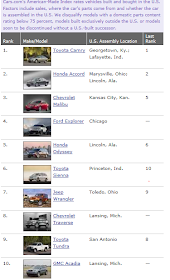"There is no profit in destruction"
No, I don't have a beach house in North Carolina. BUT in my dreams this is what would have happened as a result of hurricane Irene...
Assume in January of this year I built a beach house on the coast of North Carolina at a cost of $200,000. Gross Domestic Product (GDP) would increase (assuming ALL the construction material came from the US) by $200,000.
The hurricane comes through and destroys my house. I receive my insurance settlement and rebuild my house, BUT now the cost of rebuilding the same house costs $210,000 (inflation, scarcity of building materials, increase in insurance, etc).
GDP increases by $210,000. So far I have contributed a total of $410,000 to GDP for the year 2011. This unfortunate event seems to have a silver lining, doesn't it?
The first week of school you were introduced to the the philosophy of
Frederic Bastiat and the important concept of
opportunity cost.
Using this new-found knowledge, list/discuss some of the problems or logical fallacies related to Bastiats way of thinking and/or opportunity costs of the above scenario.
Hint: there are LOTS of opportunity costs incurred in this situation, some obvious and not so obvious. Go crazy and find as many as you can...




